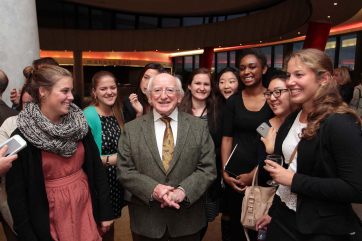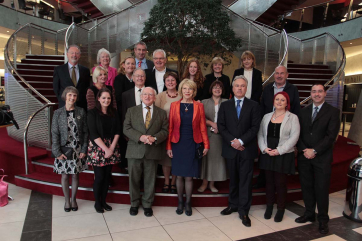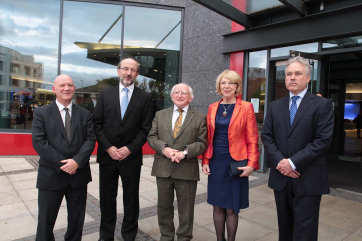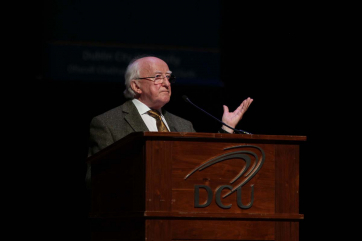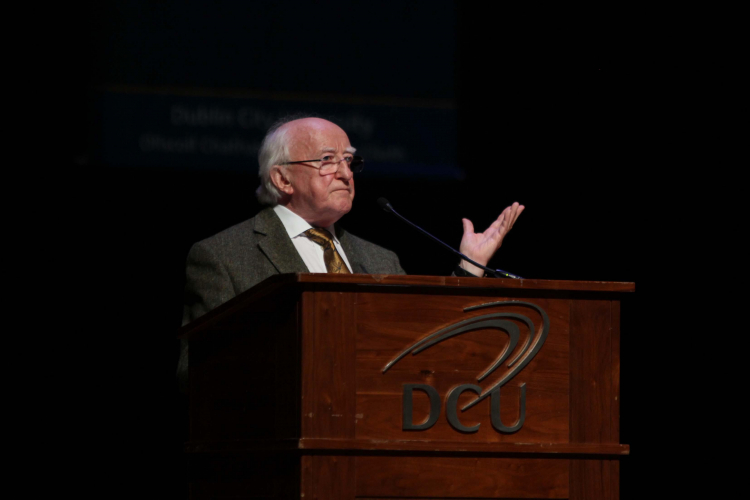
Ethics for All Public Lecture Series ‘Toward an ethical economy’
Published: Thu 12 Sep, 2013 | 12:41
Ethics for All
Public Lecture Series
‘Toward an ethical economy’
Michael D. Higgins
Dublin City University
Wednesday, 11th September 2013
It is an honour, and a responsibility I receive gladly, to have been asked to address you today as part of the ‘Ethics for All’ Public Lecture Series, organised by Dublin City University and the Matter Dei Institute of Education. May I thank the President of DCU, Professor Brian MacCraith, for kindly inviting me to deliver this address, and all of you for this warm welcome.
I have, in the early days of my inauguration as President of Ireland, said that my Presidency would seek to develop an ethical discourse that places human flourishing at the heart of public action. This is a theme and a line of reflection that I hope to develop more systematically over the course of the coming months. Therefore I welcome today’s opportunity to outline, however briefly, why I have deemed it essential that we collectively pursue a reflection on ethics, and how we, as a people, would benefit from setting about the task of formulating an appropriate discourse for a change in public consciousness.
The case for the importance of ethics can be put in quite a straight-forward fashion: we need, as a matter of urgency, to have that discussion so that we can, as David Harvey puts it, act as the “conscious architects” of the “institutional and imaginative worlds we inhabit.” Harvey, D. 2000. Spaces of Hope. Edinburgh: Edinburgh University Press, p. 159.
With this in mind, I would like – tonight – to focus in particular on the relations between ethical reasoning and economic thought. I will endeavour to do so by raising some fundamental philosophical questions that are aimed at setting out the general case for an ethical consciousness. And while this may be preliminary to the more specific interests of ‘professional ethicists,’ some of them present in the audience, who concern themselves with the application of ethical codes of conduct to biological and medical practice, legal practice, business, or the various academic disciplines dealing with human subjects, it is, I believe, crucial as a basis. Codes, protocole and procedures mean little unless they are located in a value system that can be shared and understood by all.
The current state of the European economy, with its high levels of unemployment, poverty and increasing inequality, is a source of concern, anxiety and even moral outrage for many of our fellow citizens. There is, I know, an ongoing debate at national, European and global level as to the acceptability and efficiency – indeed as to the legitimate mandates – of the orthodox policy responses that were implemented to contain the multifarious consequences of the financial meltdown of 2008. This evening I situate my argument upstream of this debate by suggesting that the problem might not lie so much in a lack of the right answers to this most recent crisis of capitalism as in an absence of the right questions.
What constitutes a good life? What is necessary to human flourishing? What kinds of human capabilities do particular societies value, encourage, genuinely enable, or block? What conceptions of human nature and the good society underpin our contemporary economic discourse? Can we, as ordinary citizens, enter the discourse on economic policy issues, or are we too economically illiterate for that? Are the issues so complex as to require their being lifted out of the democratic parliamentary system? These are but a few examples of the questions our times require us to raise. Posing the problem in such terms encourages us, I hope, to take a step beyond critical analysis in order to think positively about a set of principles by which we might live and explore the contemporary possibilities for developing ethical arts of economic government.
Before I set to this task, allow me to formulate just one more preliminary question: why is it that there is an absence of the right questions? The answer, I suggest, has to do with obstacles placed in the way of such questions by institutional or ideological falsehoods. It also has to do with the exceptional status of economics as a discipline, within the field of the social sciences. This observation of mine is neither uncommon nor new. But the recent crisis has failed, so far, to prompt any far-reaching self-examination within departments of economics in universities across the world, as to how economics is taught and should be taught, and what the consequences are of teaching in terms of policy prescription.
In his last and important book entitled L’Empire de la valeur, Orléan, A. 2011. L’Empire de la valeur. Refonder l’économie. Seuil. This book won the “Paul Ricoeur Prize” in 2012. economist André Orléan remarks that the social sciences all deal with values – whether religious, moral, aesthetic, etc. – and that economics makes the same basic assumption as the other social sciences do, namely that members of society are able to coordinate their behaviour because they share certain values. But economic theory is unique, he claims, in that it has traditionally defined ‘value’ as a ‘substance:’ labour value in the case of classical theory; utility value in that of neoclassical theory. Thus, whereas their fellow social scientists regard value as a set of social representations, the expression of collective beliefs, economists use ‘value’ as if it were an objective fact, which facilitates a claim to scientific status for economics.
Orléan goes on to relate a meeting of the French Association of Political Economy in 1908, at which Émile Durkheim delivered a paper pointing out the limits of this contrast:
“At first sight,” Durkheim argued, “political economy appears to deal with facts of a very different nature from the other social sciences. Morality and law are essentially matter of opinion. Wealth, which is the subject of political economy, seems on the contrary to be essentially objective and independent of opinion.”
But he hastened to suggest that the distinction was actually misleading. I quote:
“However the present speaker believes that economic facts can be approached from another viewpoint; they are also, to a degree that I will not attempt to define, a matter of opinion … The level of wages depends on a fundamental standard that corresponds to the minimum of resources necessary for a man to live. But this standard is determined, in every era, by opinion. What yesterday was considered to be a sufficient minimum no longer satisfies the requirements of moral conscience today.”
To Durkheim’s great surprise, his remarks were greeted with shock and dismay among the economists in attendance:
“Opinion,” Edmond Villey replied, “does not determine value, which is determined by rigorous natural laws … It is always the law of supply and demand, completely independent of opinion, which determines prices, as it determines all values.”
It is nowadays possible to say that Durkheim has failed in his project of bringing his economist colleagues to acknowledge that “an economic fact is a social fact like any other,” and that value is first and foremost a social institution. Had he succeeded, we perhaps could more readily engage with the normativity inherent to the production of economic knowledge.
Such a move is important if we are to read through the language of certainty and inevitability that currently drapes economic policy issues and that is so damaging to our democracy. We are not the dependent variables of unknowable and uncontrollable forces. Indeed, as Ernst Bloch put it, “the root of history is the working, creating human being who reshapes and overhauls the given facts.” Bloch, E. 1986. The Principle of Hope. London: Basil Blackwell, p. 1376.
It would be foolish to assume that the brand of economic reasoning that currently dominates both academic and policy thinking is non-ideological. Here I am making reference in particular to a range of ideas and theories that relate to the neoliberal doctrine, and I do so in conscious knowledge of the difference between that doctrine and both classical and neo-classical theory. Neoliberalism, then, does make assumptions about human nature and the good society. Yet these are rarely stated. Neo-liberal propositions are usually presented as pragmatic responses, while ‘ideology’ is ostensibly rejected as the imputed flaw of others, who may have a commitment to models of social economy or institutional economics that might take account of contingencies such as unemployment.
The widespread notion that neo-liberalism as a coherent doctrine doesn’t exist is hardly consistent with what Friedrich von Hayek described as the “gradual encroachment of [the] ideas” that he and a number of like-minded intellectuals endeavoured to promote in the second half of the twentieth century. Neoliberalism has, from the first meetings of Ludwig Von Mises, Hayek and Milton Friedman, been a conscious ideological project. By looking at how certain structures of ideas came to prevail we can trace the origin of the contemporary suggested inevitability in policy prescriptions.
In this regard, it is useful to refer to historian of economic thought
Philip Mirowski’s analysis of the activities of the Swiss-based ‘Mont Pelerin Society,’ founded in 1947 on a closed-membership basis, which was for a while the premier site of construction of neoliberalism. Mirowski, F. 2013. Never Let a Good Crisis Go to Waste. Verso. Mirowski describes the Society as a “thought collective,” whose project was to outline a future movement diverging from classical liberalism, and he traces the migration of their ideas to university departments, think tanks and policy making circles at both national and international level.
Such an archaeological approach to economic knowledge is a tool that enables us to assess the ethical consequences of the views neoliberal thinkers harbour about what it means to be human, and the institutional arrangements that underpin their vision of the good society.
Indeed neoliberalism is based on strong assumptions about human nature. As another archaeologist of ideas, Michel Foucault, put it,
“in neoliberalism … Homo Economicus is an entrepreneur, an entrepreneur of himself.” Foucault, M. 2008. The Birth of Biopolitics. New York: Palgrave Macmillan, p. 226. This “government of the self”, the notion that men’s economic worth can be defined in terms of human capital and skill sets constitutes a drastic departure from classical liberal doctrine. Neo-liberalism has operated a profound deconstruction of the special status classical liberalism conferred on human labour, and it is worth exploring a bit further the fundamental differences between these two visions of human nature.
In his introduction to a recent edition of The Theory of Moral Sentiments, Amartya Sen notes that this book – which was Adam Smith’s first, published in 1759 – “went into something of an eclipse” from the beginning of the nineteenth century.
As a result of this, according to Sen, Smith’s second book, An Inquiry into the Nature and Causes of the Wealth of Nations, widely regarded as having “transformed the subject of economics”, was read and interpreted largely without reference to the philosophical framework developed in the earlier work The Theory Moral Sentiments. I quote Sen:
“The neglect applies, among other issues, to the appreciation of the demands of rationality, the need for recognizing the plurality of human motivations, the connections between ethics and economics, and the
co-dependent – rather than free-standing – role of institutions in general and free markets in particular.” See Amartya Sen’s introduction in Smith, A. 2010. The Theory of Moral Sentiments. Penguin Classics.
A strong tradition in economic literature therefore draws from what is a selective reading, even a distortion of Smith. They focus primarily on his famous line stating that “it is not from the benevolence of the butcher, the brewer, or the baker that we expect our dinner, but from their regard to their own interest.” This fits neatly into the rational choice theory, which equates rationality with the “enlightened” pursuit of self-interest.
Smith, of course, has spelled out very strongly the limitation of the profit motive, by arguing, for example, that while “prudence” was “of all the virtues that which is most helpful to the individual,” “humanity, justice, generosity, and public spirit, are the qualities most useful to others.” Moreover, although he was convinced of the necessity of a well-functioning market, he never argued against the importance of economic institutions other than the markets, nor did he deny that the market economy produced important “omissions.”
Sound political economy, Smith argued in the The Wealth of Nations , has to have “two distinct objects”: “first, to provide a plentiful revenue or subsistence for the people, or more properly to enable them to provide such a revenue or subsistence for themselves; and secondly, to supply the state or commonwealth with a revenue sufficient for the public services” that people agree are needed.
This stands in sharp contrast with Hayek’s vision of the market as a fantastic processor of information, more powerful than any human brain, that necessarily surpasses the state’s ability to manage and process information. According to Mirowski, this view of Hayek’s underpins the contemporary proliferation of baroque financial instruments and the notion that the market always provides solutions to the problems it has created in the first place, whether in the form of carbon emissions permits, microloans, or through the belief that the best people to clean up the crisis are the same bankers and financiers who caused it. Let us never forget Alan Greenspan’s phrase when advocating against the regulation of Wall Street that the Glass-Steagall Act represented –
“The market is screaming for product.”
These views also differ from neoclassical economy narratives, that envisage potential market’s “failure” – notably in the environmental sphere – through the notion of “externalities.”
Finally, before I examine how we might be able to introduce, embed, and sustain a strong ethical dimension in the structures, both ideological and institutional, that shape our collective life, let me suggest that – whatever the performative declarations about the rolling-back of the state, which Jamie Peck labels “regulation-in-denial” Peck, J. 2010. Constructions of Neoliberal Reason. Oxford: Oxford University Press, p. xiii. Quoted in Mirowski, P. Op.cit., p.56. – there is a distinctively constructivist dimension in neo-liberalism. It is consciously created and recast. Foucault rightly emphasized the “activism” and “perpetual interventions” of proponents of that doctrine, for whom the good society doesn’t naturally and spontaneously arise. The state is allowed to play a role in neo-liberal thinking but it is ‘retasked’ and restructured, through the use of audit devices, or the outsourcing of previously state-run services, such as mortgage lending for example.
All the above-mentioned dimensions have to be kept in mind as we move to posit an alternative set of principles by which we might think and live more ethically. So how might we proceed to embed a strong ethical dimension in the structures that shape our collective life? What are the contemporary possibilities for developing ethical arts of economic government? What are the sources of ethics and how might a consciousness on the importance of ethics be supported?
A first, obvious, avenue for action is education, as a field fundamental to the formation and transformation of young people both as subjects and agents. Indeed the proliferation of ethical manuals and codes of conduct in the various professional sectors will be of only limited consequence if we do not also ensure that their purpose is understood by, and not just enforced upon, those for whom they are designed.
Our schools’ curricula and pedagogical methods reflect the kind of humanity our society seeks and nurtures. The society we so dearly wish for will not take shape unless we acknowledge the need for an education of character and desires, the need to encourage and support critical reflection and a more holistic approach to knowledge. Specifically, there would surely be considerable merit in introducing the teaching of philosophy in our schools, which could facilitate the fostering of an ethical consciousness in our fellow citizens.
- I was very impressed to read of the submission in 2012 from the Royal Irish Academy to the Curriculum Development Committee proposing the inclusion of philosophy as a formal Leaving Certificate subject. In my consultation – Being Young and Irish – last year, young people themselves called for something similar. Even an excellent version of ‘Politics and Society’ is not an adequate substitute. Philosophy as a training in how to think, how to address issues of decision-making in areas of life’s fundamental and applied questions, is a gift of skill – a skill that can be taught and acquired.
When widely distributed, it can facilitate the emergence of a consensus around shared concepts of rights and duty, charity, equality, in a way that acknowledges the right to democratic participation in a deliberative democracy.
Moreover, if the central goal of philosophy is, as suggested by Martha Nussbaum “human flourishing”, there is surely much to be gained from a return to Aristotle, among other scholars, and the field of virtue ethics, which points to an active, rather than passive, view of flourishing, in which humans seek a life that they have reason to value.
A second possible purpose for action is to examine the means by which we can embed in both our ideology and our institutions values that emphasise the irreducibly social and relational dimension of the human condition.
In that regard, the directions outlined by scholars in the field of care, such as Kathleen Lynch and her colleagues from the School of Social Justice at UCD, are positive and valuable.
Here I refer to care not so much as a professional sector but primarily as an ethical sentiment, that is, as a central human capability serving a fundamental human need.
As Lynch puts it, “bonds of friendship or kinship are frequently what bring meaning, warmth and joy to life… They are both a vital component of what enables people to lead a successful life and an expression of our fundamental interdependence.” Lynch, K. et als. 2009. Affective Equality. Love, Care and Injustice. Palgrave Macmillan, p.1 Care, therefore, is a relational practice that engages both parties emotionally, cognitively and physically.
Being cared for is not only a condition for survival, it is also a prerequisite for human development and well-being. “All of us have urgent needs for care at various stages in our lives, as a consequence of infancy, illness, impairment or other vulnerabilities.” Ibidem. The reification of the term ‘vulnerable’, through its association with specific categories of people – “vulnerable older people”, “vulnerable children” –, can obscure the fact that none of us present here tonight are ‘invulnerable.’ The myth of the ‘invulnerable’ does, of course, prevail at the centre of the recklessly speculative world we are trying to reform.
Care, love and friendship – understood not only as feelings but also as modes of action – are powerful heuristic tools for the general purpose of our discussion on ethics and economics. Indeed they quite radically undermine the vision of man as a self-sufficient individual, concerned primarily with the enlightened pursuit of his self-interest. Does it make sense, we might ask ourselves, to say that the care a mother and father give their children rests merely on a rational calculation of their own interests? Is the instinct to care for another person quantifiable, transferable, or commodifiable?
To reflect on the demands of care, love and friendship is to replace the categories of utility, efficiency and self-love with the values of mutuality, long-term commitment, trust and responsibility. It is to conceive of the Other as an end in himself, as a source of non-reciprocal responsibility, in the sense of Emmanuel Lévinas.
Care also raises the fundamental question of how we relate to time; of how we measure and institutionalise it.
This question of measurement too is a vast and important one. I strongly believe that we need to re-examine the categories by which we gauge economic value and human worth, as well as the language we employ to do so. It is not an exaggeration to say that we live in times where economic worth is primarily seen as a matter of productive capacity. This is reflected in the use of measures for growth as the principal measure of economic health, even if that growth does not impact on the levels of unemployment, poverty and inequality.
There is an interesting strand of scholarship criticizing the focus on market activity as the measure of the size and health of the economy. GDP [Gross Domestic Product] does indeed measure the flow of market transactions but it excludes the other spheres of human activity, whatever the amount of time, effort or care invested in them. So much of the work of maintaining and enhancing human livelihoods takes place outside the market.
Can we find a compass that recognizes the salience of care, love and other activities deployed outside of the formal market sector as goods of public significance? This would require no less than a redefinition of work – and what is understood by good work. It is vital that we find ways to formally value the unique contribution that each citizen makes to society, all the more so since we are living through an era of high unemployment.
In her book entitled Utopia as Method, Ruth Levitas conjures up pre-Raphaelite Brotherhood member William Morris’s question to expose the limitations of the current focus on GDP as an exclusive measure of growth:
“Is it all to end in a counting house on the top of a cinder heap?” – Morris asked in 1894. Morris, W. 1894. How I Became a Socialist. Quoted in Levitas, R. 2013. Utopia as Method. The Imaginary Reconstitution of Society. Palgrave Macmillan, p. 173.
To which question one could reply by quoting Keynes:
“Once we allow ourselves to be disobedient to the test of an accountant’s profit, we have begun to change our civilization.”
In other words, the cinder heap can only be avoided if we change what the counting house counts and start measuring everything that matters – including education, health, and the care we take of our natural environment.
Since the 1970s, a significant concession has been made to the arguments against GDP as an exclusive measure, notably through the development of social indicators: the United Nations Human Development Indicators now include aggregate measures of human capital (sic), health status and educational participation. Then too, a number of prominent economists, while staying within the frame of market economics, have argued in favour of a focus on the wellbeing and happiness of populations rather than on GDP, as have
Joseph Stiglitz, Amartya Sen and Jean-Paul Fitoussi in their 2009 report on ‘Economic Performance and Social Progress.’
But perhaps the problem is even more profound than any choice of indicators and has to do with the very notion that it is possible to count and quantify such things as happiness, or human progress. The fascination with quantification is a distinctive feature of our times. The rise of mathematical economics and its current hold on policy has a knowable history. That trend can be traced beyond Léon Walras’s Elements of Pure Economics and the marginalist revolution, back to William Petty, the first numerical economist, whose ideas were later developed by Cantillon and Jevons. In the late seventeenth century, Petty described his endeavour in these terms:
“The method I take to do this is not yet very usual; for instead of using comparative and superlative words, and intellectual arguments, I have taken the course (as a specimen of the Political Arithmetick I have long aimed at) to express myself in terms of number, weight or measure.” [Quote from 1690]
As to the project of renewal, I would like to make the contentious assertion that economics as a discipline may gain in considering itself as a craft, not a science. And I share Ruth Levitas’s argument in her recent Utopia as Method that “we cannot measure happiness, love or grace, or put a price on the beauty of the earth, [but that] alternative conceptualizations of human worth and social progress are plainly possible.” Levitas, R. Op.cit., p.201
Finally, about our institutions. We need to make sure that all institutions allow for truly democratic deliberations on economic policy choices, that no particular sector gets preferential treatment in the name of a narrow conception of wealth, and that our media do not foreclose political debate on economic matters.
We should, as a nation, be able to conduct a reflection on economic issues in a way that respects the thread of discourse, even if we are to disagree. For this, we might draw upon the recent work on Europe by Jürgen Habermas, which suggests that democratic participation and self-development can go together when they are informed by the values of tolerance, reciprocity, morality and reflexivity.
As importantly, if we genuinely want to develop a society in which people are “confident of having ample prospects for caring and solidary relationships,” Lynch, K. Op.cit., p.2. then we must endeavour t0 change the structures that impede the development of such relationships, and restore the commitment to reducing poverty and economic inequality as a project that is at the very heart of public action.
In doing so, our commitment to equality must go beyond the notion of equality of opportunity, and face our own, often buried, selfishness. In his 1931 book entitled Equality, Tawney vividly depicted – through his parable of the frog and the tadpoles – the convenient self-delusions on the part of those members of society that one might have expected to be vocal in their opposition to inequalities:
“Intelligent tadpoles”, Tawney wrote, “reconcile themselves to the inconvenience of their position by reflecting that although most of them will live to be tadpoles and nothing more, the most fortunate of the species will one day shed their tails, distend their mouths and stomachs, hop nimbly on the dry land and croak addresses to their former friends on the virtue by which tadpoles of character and capacity can raise to be frogs.”
It is possible, I suggest, to build our society on the principle of solidarity, which in the short term means, as I wrote in Renewing the Republic “establishing a floor of citizenship below which no citizen would be allowed to fall. … In a Republic, the right to shelter, food, security, education, a good environment, and freedom from fear and insecurity from childhood to old age, must be the benchmarks.” Higgins, M.D. 2011. Renewing the Republic, Liberties Press, p. 61
Mar focal scoir, May I conclude by stressing that the formulation of explicit alternative scenarios for the future is fundamental to any kind of democratic debate. Discovering and developing in our present thinking about the economy and society an orientation to alternative possible futures entails more than a return to ‘business as usual.’ As I have written elsewhere, “we need a discourse which will envisage the alternative, inclusive society and the new social economics. This is what Ernst Bloch called ‘anticipatory illumination.’ It is not only about the right to survive, it is about the right to flourish.” Ibidem, p. 61.
We must do all this utilising the light let in by the cracks; doing what we can now, taking opportunities while holding fast to our vision for the medium and longer term.
And if from all of the possible starting points I had a choice, I think I would reflect on Aristotle’s advice to his son Nicomachus, that friendship makes a demand on our virtue greater than justice. An ethics of Aristotelian friendship, infused with notions of care and responsibility, is a fruitful paradigm to conceive of our relations to our fellow citizens and to future generations. It also provides a fitting mode of envisaging, and acting for, the future of our planet – more so, perhaps, than notions of short term utility, or even preservation.
Finally, we must reclaim the future as an arena of hope. As Bruno Schulz put it, “the possibility suggests itself that no dreams, however absurd or senseless, are wasted in the universe. Embedded in the dream is a hunger for its own reification, a demand that imposes an obligation on reality.” The point, therefore, is not to rescue any lesser pragmatism, but to “raise up our humanity” Unger, R. M. 2007. The Self Awakened: Pragmatism Unbound. Cambridge, Mass.: Harvard University Press, p.2. and in doing so eliminate so much fear from our lives, enjoy the endless possibilities of our lives together, taking care.

